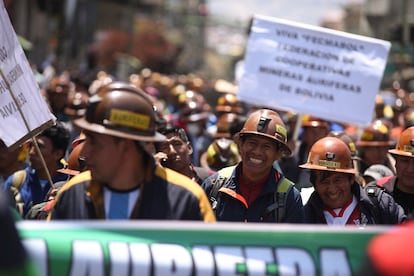Protests by Bolivian miners turn violent
The mineworkers seek a repeal of the resolution barring them from Madidi National Park in the upper Amazon river basin

Protest marches in La Paz by the union of Bolivian gold miners turned violent after several days of demanding the repeal of a government resolution barring them from working in the country’s protected areas, especially Madidi National Park, a huge preserve in the upper Amazon river basin with the world’s greatest biodiversity of flora and fauna.
On November 6, miners threw stones at security forces and temporarily occupied the National Protected Areas Service’s headquarters demanding access to Madidi (northwestern Bolivia), a gold-rich area with alluvial deposits along its riverbanks and beds. Miners extract the gold using toxic mercury that pollutes the environment and harms the local populace. Several studies have demonstrated the potentially deadly neurological and other effects of eating contaminated fish.
The protesters also attacked the offices of the mining authority, which they blame for “not providing them with legal protection.” The mining authority takes a long time to approve concessions, which then must undergo another lengthy approval process by the country’s legislature. Rival mining companies are constantly disputing exploitation rights with each other and with Indigenous peoples in the concession areas.
Bolivia’s Federation of Gold Mining Cooperatives of Bolivia (FECMABOL) says the tangled situation benefits the rising numbers of illegal miners who extract gold without government permission. FECMABOL also wants the release of 5,000 land plots with mining potential held by the state mining company. The demonstrators have threatened to block roads until their demands are addressed.
President Luis Arce, now in the third year of his term, spoke at a military event during the ongoing protests and said it’s the Bolivian Navy’s responsibility to prevent illegal gold mining because of the dredgers that navigate up and down the rivers digging up the alluvial gold.
Police dispersed the protesters with chemical spray and placed several miners in preventive detention. Some Bolivians think the government is reluctant to antagonize the politically powerful mining cooperatives that support the ruling Movement towards Socialism (MAS) party led by former President Evo Morales. FECMABOL is a federation of about 1,000 gold mining cooperatives with over 80,000 members, but only represents 5% of all the mining cooperatives in the country. Small mining cooperatives emerged following the closure of large state mining companies in the 1990s. But two decades of high mineral prices have led to a complex landscape in Bolivia. Artisanal miners coexist with wealthy mine owners who camouflage their companies as cooperatives to avoid taxes. Chinese and Colombian investors tend to be the biggest investors in Bolivian gold mining.
One of the miners’ demands is a fixed 4.5% tax on annual production, but the government wants a 7% rate to reap greater rewards from the country’s gold rush. In 2022, gold exports amounted to $3 billion and became the main Bolivian export, surpassing gas, zinc and soybeans. There are two reasons for this boom – global prices have doubled in the last decade and the alluvial gold is easy to extract. In 2013, a kilo of gold cost around $30,000; now it’s hovering around $60,000. Riverine gold mining only requires dredges and brute force to dig up and sift the earth. Mercury, which is easy to obtain in Bolivia, is then used to separate the mineral from the rock.
Sign up for our weekly newsletter to get more English-language news coverage from EL PAÍS USA Edition
Tu suscripción se está usando en otro dispositivo
¿Quieres añadir otro usuario a tu suscripción?
Si continúas leyendo en este dispositivo, no se podrá leer en el otro.
FlechaTu suscripción se está usando en otro dispositivo y solo puedes acceder a EL PAÍS desde un dispositivo a la vez.
Si quieres compartir tu cuenta, cambia tu suscripción a la modalidad Premium, así podrás añadir otro usuario. Cada uno accederá con su propia cuenta de email, lo que os permitirá personalizar vuestra experiencia en EL PAÍS.
¿Tienes una suscripción de empresa? Accede aquí para contratar más cuentas.
En el caso de no saber quién está usando tu cuenta, te recomendamos cambiar tu contraseña aquí.
Si decides continuar compartiendo tu cuenta, este mensaje se mostrará en tu dispositivo y en el de la otra persona que está usando tu cuenta de forma indefinida, afectando a tu experiencia de lectura. Puedes consultar aquí los términos y condiciones de la suscripción digital.








































